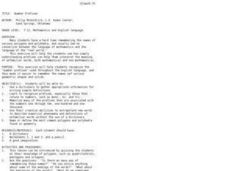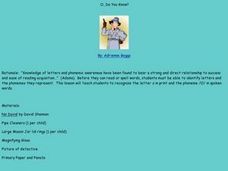K12 Reader
Geometric Shape Names
Combine math and language arts in the same lesson with a reading passage about number prefixes in geometric shapes. After reading several short paragraphs about the different prefixes used in shape names, kids answer five comprehension...
Curated OER
Number Prefixes
Students recognize the number prefixes used throughout the English language. They identify the shapes and the prefixes that are associated with them.
Curated OER
Investigating Polygons
In this math worksheet, learners read information about 6 types of polygons and their sides and angles. Students then answer 5 questions about the geometric figures.
Curated OER
Pattern Block Polygons
Sixth graders create polygons. In this shapes lesson, 6th graders explore prefixes such as oct, tri, quad, pent, etc. and share their findings. Students use pattern blocks to create two different polygons and label them.
Curated OER
Letter Recognition - o
In this letter recognition learning exercise, 1st graders examine 15 words in a box at the top of the page. They circle the words that begin with o. They read about the sounds that o makes, and examine 5 black line pictures before...
Curated OER
Match word and picture: letter o words
In this letter o words worksheet, students match the letter o words with the picture that represents them. Students match 6 words to 6 pictures.
Curated OER
Shapes Picture Quiz
In this shapes picture quiz learning exercise, students complete a set of 12 multiple choice questions, identifying shapes. A reference web site is given for additional activities.
Curated OER
O, Do You Know?
Students identify the short /o/ sound in this lesson. They discover that the "o" is shaped like a magnifying glass, and are "detectives" looking for the /o/ sound in words. They listen to "No, David!" and identify the short /o/ sound...









